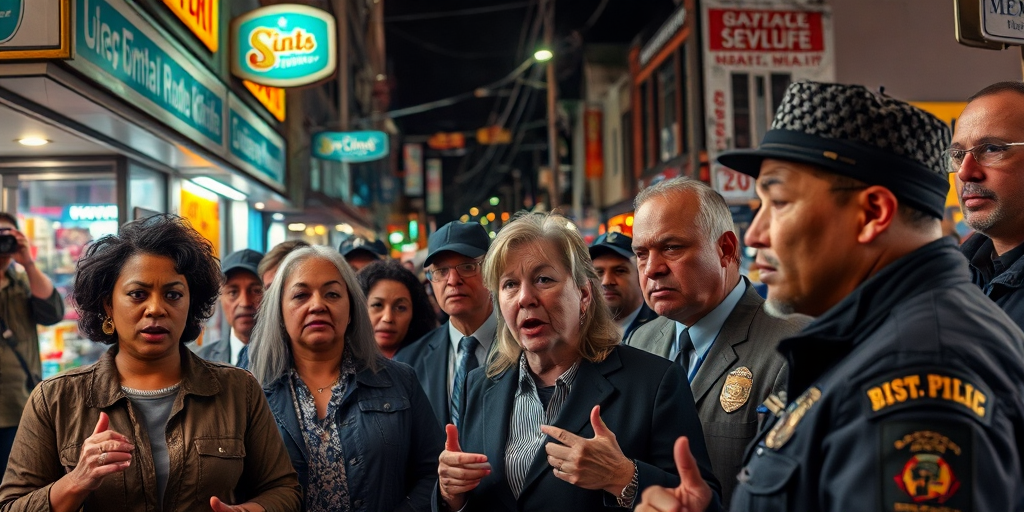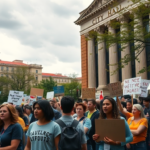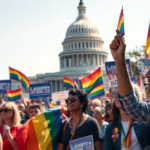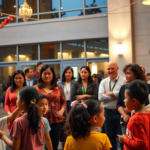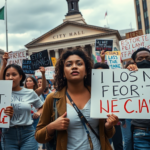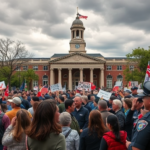**Roosevelt Avenue: At the Heart of New York City’s Quality of Life Debate**
In the bustling heart of Queens, New York City, Roosevelt Avenue stands as a vibrant thoroughfare characterized by its rich cultural diversity. Known for its variety of businesses and lively street life, this avenue is now at the center of heated discussions surrounding crime, community values, and quality of life, which have become critical issues in the upcoming mayoral race. As candidates debate on how best to address the complex challenges faced by this iconic street, residents are pondering the potential implications for their community and its future.
**A Microcosm of Multicultural America**
Roosevelt Avenue is more than just an urban street; it’s a microcosm of multicultural America. Spanning through neighborhoods like Elmhurst, Corona, and Jackson Heights, the avenue is lined with a wide array of businesses, from Colombian restaurants and taco stalls to Indian grocery stores and fruit stands. This vibrant mix showcases the ethnic and cultural richness that defines the area, contributing to its unique local impact and making it a place of community interest.
However, amid the cultural harmony, there are underlying contentious issues. The presence of sex work along the avenue has long been a topic of concern, drawing attention from policymakers and law enforcement alike. As New York City mayoral debates unfold, this issue has taken center stage, shedding light on divisive policy proposals and stirring public opinion.
**A Divisive Mayoral Debate**
The upcoming mayoral election has brought these issues to the forefront, with candidates offering starkly contrasting views on the best path forward. Independent candidate Andrew Cuomo, a former New York Governor, has seized upon the matter to challenge Democratic nominee Zohran Mamdani. Cuomo criticizes Mamdani’s progressive stance on decriminalizing sex work, particularly using cultural and religious rhetoric aimed at South Asian and Muslim voters.
Cuomo’s campaign appeals to conservative voters within these communities by labeling Mamdani’s policies as “haram,” or forbidden, in Islamic terms, citing the need to maintain moral and social standards. This strategy has drawn sharp criticism for being divisive, as it attempts to exploit cultural and religious sentiments to sway public opinion.
Farhad Soleiman, general secretary of the Jackson Heights Bangladeshi Association, expressed his concerns, stating, “These are issues we can’t ignore, and Mamdani’s stance on decriminalization raises questions about safety and values in our neighborhood.”
**Mamdani’s Balanced Approach**
In response, Zohran Mamdani advocates for a more nuanced understanding of the issues affecting Roosevelt Avenue. While supporting the decriminalization of consensual adult sex work, Mamdani emphasizes that he does not endorse full legalization. He argues against penalizing struggling individuals—particularly women—pushed into sex work by economic hardship.
During a recent debate, Mamdani made his position clear, emphasizing, “We should not criminalize women who are trying to survive. Our focus should be on decriminalizing their situation while addressing issues of trafficking and exploitation.”
Mamdani’s approach finds support among local leaders like New York City Councilman Shekar Krishnan, who represents Jackson Heights. Krishnan criticizes Cuomo’s tactics, stating, “This should not be a wedge issue that divides our community. We need solutions that work for everyone, acknowledging the challenges of affordability and safety.”
**Community Concerns and Safety Initiatives**
The debates have reignited conversations about safety on Roosevelt Avenue, leading to mixed feelings within the community. Initiatives like “Operation Restore Roosevelt,” launched under Mayor Eric Adams, were implemented in response to crime concerns, resulting in over 2,500 arrests. While this effort contributed to a decline in crime rates, it also faced backlash for its disproportionate impact on undocumented immigrant communities.
Mateo Guerrero, a lead organizer at Make the Road New York, highlights the fears these operations generate, explaining, “Policing efforts create an atmosphere of fear among undocumented residents, discouraging them from seeking help even when victimized.”
Proponents of Cecilia’s Law, which seeks to remove penalties for consensual sex work and ensure protections against trafficking and exploitation, argue for policy changes that prioritize safety for marginalized groups without criminalization.
**Future Implications for Roosevelt Avenue**
The unfolding electoral discourse around Roosevelt Avenue underscores a deeper struggle to balance progress with preservation in a rapidly evolving city. The outcome of the mayoral race could set a precedent for how New York City, and broader urban areas, address the intricacies of quality of life, community values, and safety.
For residents and stakeholders of Roosevelt Avenue, these developments could shape future policies affecting their daily lives, economic opportunities, and social dynamics. A holistic approach that includes community engagement, economic revitalization, and support for vulnerable populations may pave the way for long-term improvements.
**Community Engagement and Resources**
In light of these ongoing debates, residents are encouraged to participate in local forums and discussions hosted by community organizations and councils offering platforms to voice concerns and suggestions. This engagement is crucial as the community grapples with changes that resonate beyond the vibrant streets of Roosevelt Avenue, reflecting broader societal shifts in urban America.
As the mayoral election draws nearer, Roosevelt Avenue’s story is emblematic of a city’s—and a nation’s—quest to reconcile diverse identities with shared aspirations for community prosperity and quality of life.

